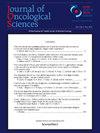{"title":"新冠肺炎大流行期间肿瘤科肿瘤治疗患者心理困扰评价","authors":"Y. Kemal, A. Karabekiroğlu, Ö. Terzi","doi":"10.37047/jos.2021-87089","DOIUrl":null,"url":null,"abstract":"Objective: Patients with cancer have an increased risk of severe coronavirus disease-2019 (COVID-19) because their immune systems are suppressed due to cancer treatments or cancer itself. Therefore, patients with cancer are prone to COVID-19 infection. In this study, we evaluated the anxiety of patients receiving cancer treatment in our oncology department during the COVID-19 pandemic. Material and Methods: This descriptive cross-sectional study consisted of 220 patients receiving cancer treatment in the medical oncology clinic of our hospital between 01 and 30 April 2020. Study data were obtained using a questionnaire consisting of 26 questions. The Hospital Anxiety and Depression Scale was used to determine the patients’ psychological distress. The scale results were compared with the results of Kruskal-Wal- lis, Mann-Whitney U, and chi-square tests. Results: We observed that 80 (36.4%) and 40 (18.2%) of the 220 patients studied had risks of de¬pression and anxiety, respectively. In this study, 46.4% of the patients believed that their illness was being negatively affected by the COVID-19 pandemic, and 45.5% of the patients worried that their treatment would be interrupted during this period. Conclusion: Our results suggest that patients with cancer need more psychosocial support than do the general population during this pandemic period. These needs should be con¬sidered while planning oncological health services, and appropriate arrangements should be made. © 2022 by Turkish Society of Medical Oncology.","PeriodicalId":31838,"journal":{"name":"Journal of Oncological Sciences","volume":"1 1","pages":""},"PeriodicalIF":0.0000,"publicationDate":"2022-01-01","publicationTypes":"Journal Article","fieldsOfStudy":null,"isOpenAccess":false,"openAccessPdf":"","citationCount":"0","resultStr":"{\"title\":\"Evaluation of Psychological Distress in Patients Undergoing Cancer Treatment in an Oncology Department During the COVID-19 Pandemic\",\"authors\":\"Y. Kemal, A. Karabekiroğlu, Ö. Terzi\",\"doi\":\"10.37047/jos.2021-87089\",\"DOIUrl\":null,\"url\":null,\"abstract\":\"Objective: Patients with cancer have an increased risk of severe coronavirus disease-2019 (COVID-19) because their immune systems are suppressed due to cancer treatments or cancer itself. Therefore, patients with cancer are prone to COVID-19 infection. In this study, we evaluated the anxiety of patients receiving cancer treatment in our oncology department during the COVID-19 pandemic. Material and Methods: This descriptive cross-sectional study consisted of 220 patients receiving cancer treatment in the medical oncology clinic of our hospital between 01 and 30 April 2020. Study data were obtained using a questionnaire consisting of 26 questions. The Hospital Anxiety and Depression Scale was used to determine the patients’ psychological distress. The scale results were compared with the results of Kruskal-Wal- lis, Mann-Whitney U, and chi-square tests. Results: We observed that 80 (36.4%) and 40 (18.2%) of the 220 patients studied had risks of de¬pression and anxiety, respectively. In this study, 46.4% of the patients believed that their illness was being negatively affected by the COVID-19 pandemic, and 45.5% of the patients worried that their treatment would be interrupted during this period. Conclusion: Our results suggest that patients with cancer need more psychosocial support than do the general population during this pandemic period. These needs should be con¬sidered while planning oncological health services, and appropriate arrangements should be made. © 2022 by Turkish Society of Medical Oncology.\",\"PeriodicalId\":31838,\"journal\":{\"name\":\"Journal of Oncological Sciences\",\"volume\":\"1 1\",\"pages\":\"\"},\"PeriodicalIF\":0.0000,\"publicationDate\":\"2022-01-01\",\"publicationTypes\":\"Journal Article\",\"fieldsOfStudy\":null,\"isOpenAccess\":false,\"openAccessPdf\":\"\",\"citationCount\":\"0\",\"resultStr\":null,\"platform\":\"Semanticscholar\",\"paperid\":null,\"PeriodicalName\":\"Journal of Oncological Sciences\",\"FirstCategoryId\":\"1085\",\"ListUrlMain\":\"https://doi.org/10.37047/jos.2021-87089\",\"RegionNum\":0,\"RegionCategory\":null,\"ArticlePicture\":[],\"TitleCN\":null,\"AbstractTextCN\":null,\"PMCID\":null,\"EPubDate\":\"\",\"PubModel\":\"\",\"JCR\":\"Q4\",\"JCRName\":\"Medicine\",\"Score\":null,\"Total\":0}","platform":"Semanticscholar","paperid":null,"PeriodicalName":"Journal of Oncological Sciences","FirstCategoryId":"1085","ListUrlMain":"https://doi.org/10.37047/jos.2021-87089","RegionNum":0,"RegionCategory":null,"ArticlePicture":[],"TitleCN":null,"AbstractTextCN":null,"PMCID":null,"EPubDate":"","PubModel":"","JCR":"Q4","JCRName":"Medicine","Score":null,"Total":0}
引用次数: 0
Evaluation of Psychological Distress in Patients Undergoing Cancer Treatment in an Oncology Department During the COVID-19 Pandemic
Objective: Patients with cancer have an increased risk of severe coronavirus disease-2019 (COVID-19) because their immune systems are suppressed due to cancer treatments or cancer itself. Therefore, patients with cancer are prone to COVID-19 infection. In this study, we evaluated the anxiety of patients receiving cancer treatment in our oncology department during the COVID-19 pandemic. Material and Methods: This descriptive cross-sectional study consisted of 220 patients receiving cancer treatment in the medical oncology clinic of our hospital between 01 and 30 April 2020. Study data were obtained using a questionnaire consisting of 26 questions. The Hospital Anxiety and Depression Scale was used to determine the patients’ psychological distress. The scale results were compared with the results of Kruskal-Wal- lis, Mann-Whitney U, and chi-square tests. Results: We observed that 80 (36.4%) and 40 (18.2%) of the 220 patients studied had risks of de¬pression and anxiety, respectively. In this study, 46.4% of the patients believed that their illness was being negatively affected by the COVID-19 pandemic, and 45.5% of the patients worried that their treatment would be interrupted during this period. Conclusion: Our results suggest that patients with cancer need more psychosocial support than do the general population during this pandemic period. These needs should be con¬sidered while planning oncological health services, and appropriate arrangements should be made. © 2022 by Turkish Society of Medical Oncology.


